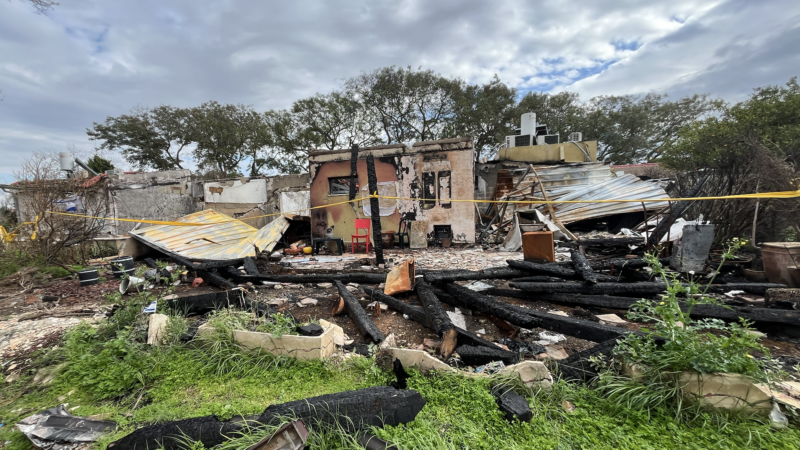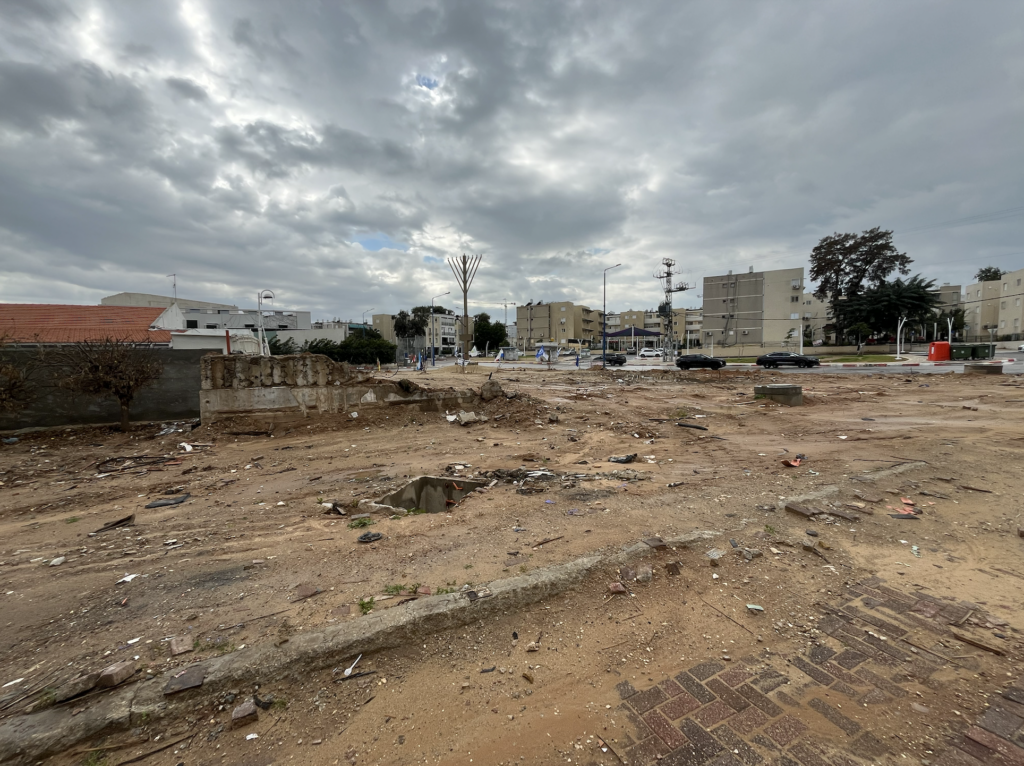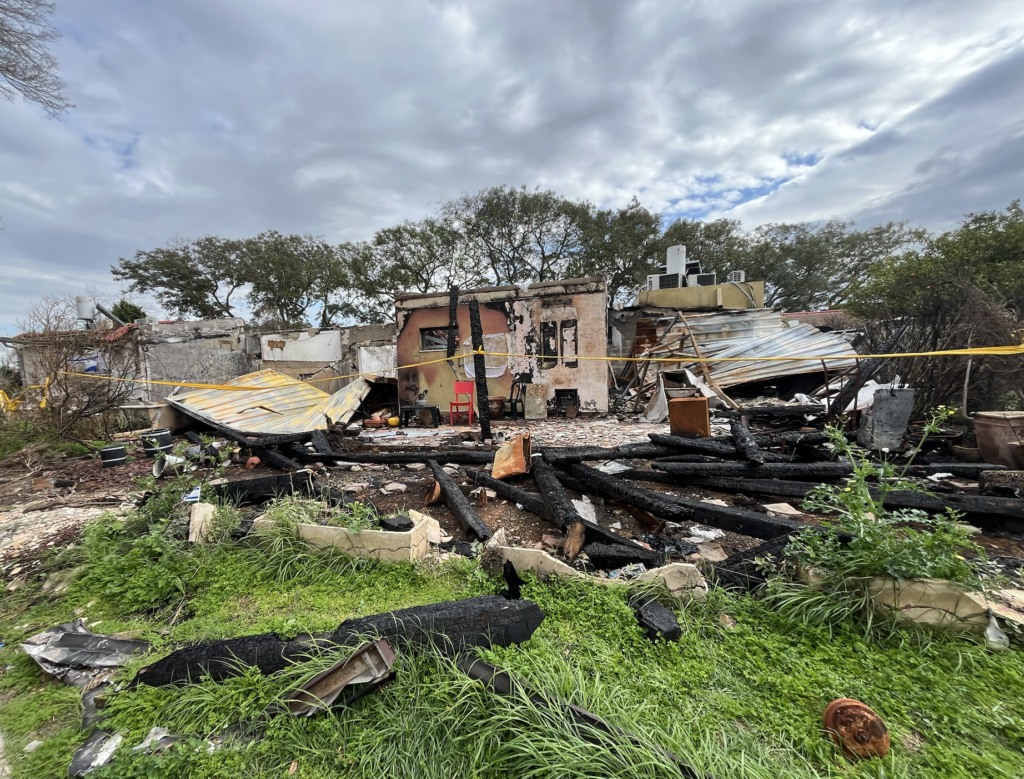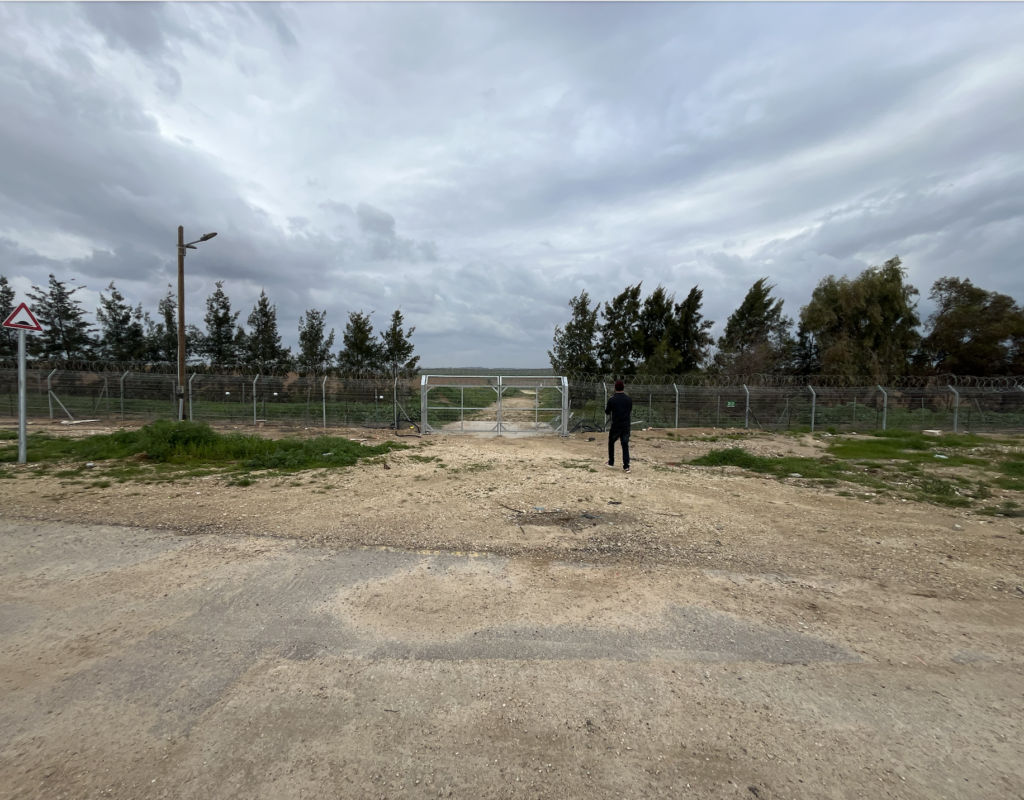Dispatch From Israel: The Symphony at Sderot
Listening to the sounds of war at the site of the October 7 Hamas attack.

"I can't believe we are going to the place where the most horrible thing happened, and it's an hour from here," says Yael.
"When it started, we were like, 'Holy shit!'" says Avi. "Then we got used to it."
Avi continues driving south, Tel Aviv to Sderot, a place most people became aware of on October 7. The videos of white pickup trucks arriving on a Saturday morning were unremarkable but for the men in the back with assault rifles. We would learn some also carried cameras, in order to memorialize what they had come to do. As one headline later read, "Everyone died."
"This is where the police station was," says Avi of a dirt lot punctuated by an air conditioner–size shaft. Otherwise, there is no sign of recent habitation, no commemoration of the hours-long firefight up stairwells and on the roof. Seven officers from the station and an untold number of Hamas militants were dead by the time the Israeli military gave the order: Hit the station with tank fire.
"There was one terrorist left in the building," Avi says. "Israeli forces demolished it, with him inside."

"We tend to raze things," says Yael, as she and Avi move up what was once a busy commercial strip. Every wall here is pocked with bullet holes, broken window glass has not been replaced, and what appears to have been a residence is missing its face, exposing a toppled-over sink and a pile of clothes. The only two other people on the street make assurances that the blood from the 50 civilians killed here on October 7 has all been washed away. Still, the town feels ghosty, abandoned. Life and death are frozen here, if not a mile away in Gaza.
"They're from Israeli cannons," says Avi of the booms that make people stop and look up, or what people there are: Ninety percent of Sderot's 40,000 residents fled after the massacre, and fewer than 15,000 have returned.
"All seven of the dead cops used to eat here," says the owner of a shawarma cafe, the only shop in the vicinity that's open. "Every day we hear about another customer who is dead."
"We were home watching the TV when it happened," says his wife, who heard the gunshots and screams on October 7 but refused to believe it was happening.
"I closed the window," she says. Her husband opened it, and they did this several times until they left Sderot that day, coming back only after three months.
"It's the first and last time I'm ever leaving. I won't let Hamas win," says her husband, adding that the owner of the sporting goods store next door went out for a jog on the morning of October 7 and was murdered.
Avi gets back on the road, the same road where hundreds of young people ran for their lives and abandoned their cars and were slaughtered on the spot or marched at gunpoint into the white pickup trucks.
"We were sleeping, a deep, deep, deep sleep," he says of what is self-evident: that Israel was unready for the assault; it had become complacent, even hubristic, trusting too much in its intelligence and the Iron Dome.
"How many people hid here in the trees and played dead?" Yael asks as they pass fields thick with banana, lemon, and avocado trees. There is normal traffic today, no sign of carnage.
"Unbelievable," Avi says under his breath, seeing army trucks guarding a newly secured area, which would never have been the case before October 7. The Nova festival was a rave in an avocado grove, for God's sake. Scanning for something to be happy about, Yael points to some tiny red flowers poking up through the mud.
These will turn out to be the only happy things for the next hour, or however long it is people stay at the memorial of 364 dead young people, who have no choice but to stay here, to be remembered at or near where they were shot, stabbed, bludgeoned, burned. It's tempting to say this is the worst thing, and it is the worst thing. But there are other worst things, including, one imagines, being asked to supply a photo of your dead daughter, to represent everything you know and love about her. This photo will be affixed to a post and sunk into the dirt. It will be decorated by you, perhaps by others, with the usual totems: flowers, candles, aphorisms. You may seek to make it personal, as you can see others have done for their murdered loved ones, with a scrunchie, a keyboard, a karate medal. But the question is, how do you pick the photo? Is it the one of her at age 5, hands held into anticipatory fists as she stands over a plate of cookies? Is it the high school graduation? Is it the most recent one, onstage accepting an award, her hair shining like a mirror and the lifetime she'd put into deserving that award making her glow? And if you can decide, how do you leave her in that field alone? How do you not curl yourself around the pole every night and say, "Just leave me here. I'll stay here."
Avi and Yael steel themselves for the next stop, a place, if not worse, then differently bad: the kibbutz where Hamas and others from Gaza breached a fence on October 7, killing 63 people and kidnapping 18 others.
"You have 10 seconds to find shelter should we hear an alarm, to either run to a safe room or lie on the ground with your hands over your head," says Ron, the young female IDF officer giving a tour of kibbutz Kfar Aza, now emptied of its 950 inhabitants. Grapefruits the size of soccer balls rot on the ground, children's bikes lie abandoned in play yards featuring miniature camel figurines, and yellow tape surrounds the worst of the October 7 kill sites, some marked with colored symbols: blue means a bomb squad has cleared the house, a number in red indicates how many bodies were found inside. Ron assures visitors that "any body parts are gone and even the birds have come back."
A bougainvillea grows outside the home of a newlywed couple who were burned alive in their safe room. The cycle of nature growing over, of healing and forgetting, seems both hopeful and obscene.

The air smells of burnt wood and something else: gunpowder.
A sign reads, "Human remains on couch." At Kfar Aza pic.twitter.com/LsRenwj07c
— Nancy Rommelmann (@NancyRomm) January 28, 2024
Avi approaches the fence where the terrorists poured through and where, according to Ron, they poured back out with what loot they could: flat-screens and cellphones and shoes taken off the women they had just murdered.

"We knew everything about everything, but we didn't know about that," Avi says, meaning the military planning Hamas was capable of, as well as how much they were willing to risk in order to slaughter their neighbors, risks that, more than three months later, reverberate every few minutes with the bombing of Gaza by the Israeli forces creating what Avi calls "the symphony of war."
Walking back to the car, he and Yael hear another note of the symphony, the muffled "pop" of the Iron Dome intercepting a rocket coming in from Gaza. Yael looks at the streaks it makes in the sky, thinks to comment, and then, does not.


Show Comments (205)